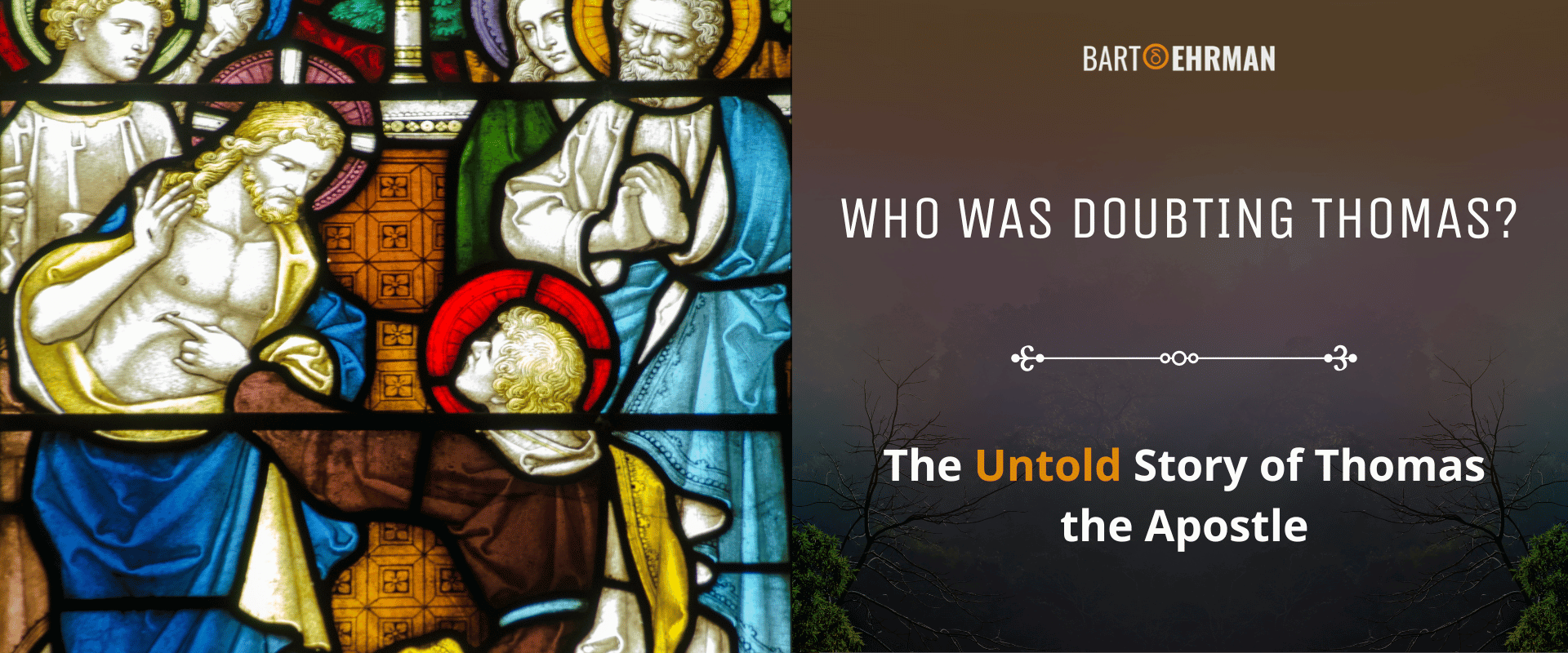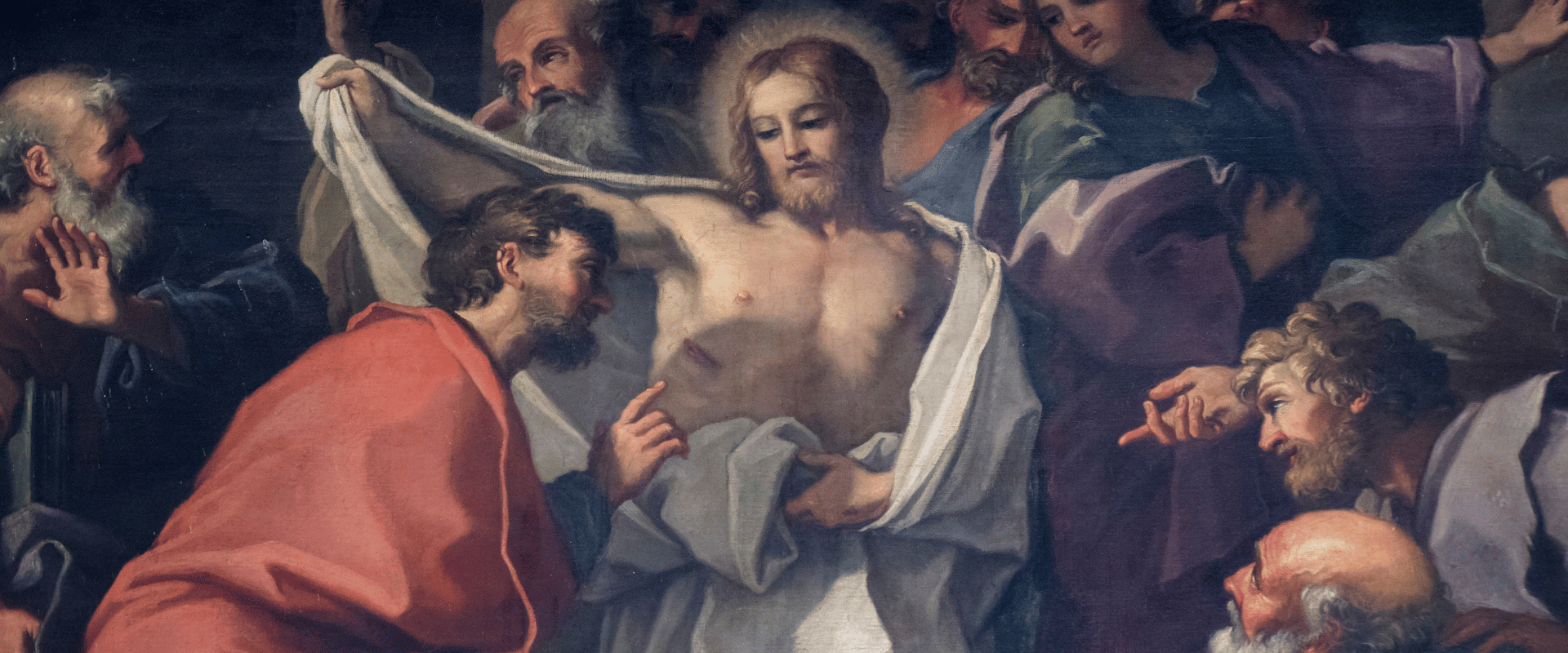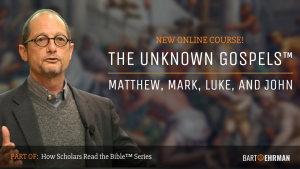Who Was Doubting Thomas? (The Untold Story of Thomas the Apostle)

Written by Joshua Schachterle, Ph.D
Author | Professor | Scholar
Author | Professor | BE Contributor
Verified! See our editorial guidelines
Verified! See our guidelines
Edited by Laura Robinson, Ph.D.
Date written: March 25th, 2024
Disclaimer: The views and opinions expressed in this article belong to the author and do not necessarily match my own. - Dr. Bart D. Ehrman
Have you ever been called a “doubting Thomas”? It’s a phrase that’s seeped into our culture through the scriptural story of the Apostle Thomas in the Gospel of John. It refers to a skeptic, someone who refuses to believe anything without personal experience. But who was Thomas?
In this article, I’ll talk about the verse and story from which this phrase comes while looking into the actual Apostle Thomas himself. I’ll delve into what the Bible and later traditions say about him as well as his mission as a follower of Jesus.

Who Was Thomas the Apostle in the Bible? (The Story of Doubting Thomas)
All three of the Synoptic Gospels – Matthew, Mark, and Luke – give us lists of Jesus’ twelve disciples. The lists differ slightly, but all three of them contain the name Thomas, originally an Aramaic name (pronounced Ta-OH-ma) meaning “twin”. In fact, in the Gospel of John, where Thomas plays a larger role, he is named “Thomas, also called Didymus,” since “Didymus” is the Greek word for twin.
While in the Synoptics, Thomas is only referred to in lists of disciples’ names, he plays a significant role in several verses in the Gospel of John.
First, in John 11:16, Jesus wants to go to Judea since his friend Lazarus is dying. Unfortunately, the last time they were there, some people had threatened to kill Jesus, so most of the disciples are reluctant to go. Thomas, however, says “Let us also go, that we may die with him [Jesus].” This demonstrates that Thomas was remembered in some traditions as being so enthusiastic for Jesus that he was willing to give up his own life for Jesus’ sake.
This is reinforced in another scene in which Jesus tells the disciples that he will prepare a place for them so that they can go where he is going, presumably to heaven after his death. Thomas, however, in John 14:5 says, “Lord, we do not know where you are going. How can we know the way?” Again, Thomas yearns to follow Jesus no matter the consequences.
In the most significant scene involving Thomas, the story of Doubting Thomas, John 20 tells us that the resurrected Jesus appears to all the disciples. Thomas, however, is regrettably absent on this occasion. This is how John 20:24-28 narrates the next scene when Jesus appears to Thomas:
But Thomas (who was called the Twin), one of the twelve, was not with them when Jesus came. So the other disciples told him, “We have seen the Lord.” But he said to them, “Unless I see the mark of the nails in his hands and put my finger in the mark of the nails and my hand in his side, I will not believe.”
A week later his disciples were again in the house, and Thomas was with them. Although the doors were shut, Jesus came and stood among them and said, “Peace be with you.” Then he said to Thomas, “Put your finger here and see my hands. Reach out your hand and put it in my side. Do not doubt but believe.” Thomas answered him, “My Lord and my God!”
This scene is significant for several reasons. First, it defines Thomas as one who is initially skeptical about the resurrection, perhaps because he was not able to die with Jesus as he had desired. However, he is also of sufficiently high status that Jesus allows him to touch his resurrected body.
Additionally, this scene helps to clarify the Gospel of John’s view of Jesus’ resurrection: it is physical. Jesus isn’t a spirit or a ghost, but instead a revivified body, maintaining the marks of his crucifixion and able to be touched by the living. Finally, Thomas, having personally experienced the risen Jesus, seems to identify Jesus as God, the first of Jesus’ followers in the Gospels to do so explicitly.
In Thomas’ final scene in John, he is among the few disciples, including Peter, who are fishing in Galilee when Jesus appears to them on the shore. Thomas has no speaking part in this scene, but the fact that he is present for another appearance of the risen Jesus surely shows how important he was considered by the author of John.
TEST YOUR KNOWLEDGE of the Historical Jesus!
Think you know the Jesus of the Bible? Uncover the historical figure behind the texts!
It's free!
Who Was the Apostle Thomas According to Apocryphal Books?
The significance of the Apostle Thomas in the Gospel of John may be what led to many other traditions and stories about him in later centuries. These are mostly preserved in apocryphal books including the Gospel of Thomas, the Book of Thomas the Contender, the Acts of Thomas, and the Infancy Gospel of Thomas. Let’s examine those books and what they say about him.
The Gospel of Thomas
The Gospel of Thomas is a non-canonical gospel which consists of 114 sayings attributed to Jesus. Scholars still debate to what extent it depends on the Synoptic Gospels for these sayings, but it does share some material with them.
There is also a debate about when it was written. Scholarly opinions range from as early as 60 CE (John Dominic Crossan), to 250 CE (J.R. Porter). The majority of scholars, however, agree with Richard Valantasis that it was written in approximately 100-110 CE, around the same time that the Gospel of John was written.
Johnson Thomaskutty notes that because the book is attributed to “Didymus Judas Thomas,” the author was identified in the early Syrian church as the apostle and twin brother (remember that both Didymus and Thomas mean “twin”) of Jesus. However, the name Thomas occurs only twice in the book.
His first mention is in the preface, which says that the gospel consists of Jesus’ sayings which Thomas wrote down. The second occurs in saying 13:
Jesus said to his disciples, "Compare me to someone and tell me whom I am like."
Simon Peter said to him, "You are like a righteous angel."
Matthew said to him, "You are like a wise philosopher."
Thomas said to him, "Master, my mouth is wholly incapable of saying whom you are like."
Jesus said, "I am not your master. Because you have drunk, you have become intoxicated from the bubbling spring which I have measured out."
And he took him and withdrew and told him three things. When Thomas returned to his companions, they asked him, "What did Jesus say to you?"
Thomas said to them, "If I tell you one of the things which he told me, you will pick up stones and throw them at me; a fire will come out of the stones and burn you up."
What does this tell us about Thomas? In the tradition that produced this book, it is believed that Jesus viewed him as uniquely worthy of secret knowledge. In fact, Jesus even tells Thomas that he is not his master, something Jesus never says to his disciples in the canonical Gospels. This indicates the tradition’s belief in Thomas’ authority.
Overall, the Gospel of Thomas provides an impressionistic picture of Thomas as a highly significant and respected disciple. This may explain the later Syrian tradition which clearly asserted that Thomas actually was Jesus’ twin brother, and therefore shared some of his spiritual authority.
The Book of Thomas the Contender
Since we have a manuscript of this book from approximately 350 CE, we know it was written before that. However, John D. Turner writes that it was likely composed in Syria in 200-250 CE.
The preface to the book says it consists of secret teachings written down by Mathaias while listening to a conversation between Jesus and Judas Thomas. The text says that because Thomas has come to know himself, he is worthy of receiving the secret knowledge from Jesus. We can see a similarity between this portrayal of Thomas and his depiction in the Gospel of Thomas.
The book actually outlines some of Jesus’ secret teachings at which the Gospel of Thomas only hinted. This starts with Jesus’ encouragement for Thomas to continue to know himself. Unlike our idea of knowing ourselves psychologically, in ancient thought this meant coming to understand one’s spiritual nature. Jesus goes on to expound many other mysterious and esoteric teachings.
Again, while the teachings themselves are significant for understanding this tradition, the greatest significance for us is the primacy given to Thomas as Jesus’ worthiest disciple. Both of the previous books about Thomas make the assumption that only he received this secret knowledge from Jesus, which he then passed on to the community for whom these texts were written.

The Acts of Thomas
The Acts of Thomas is a 3rd-century CE text, written in the Syriac language, probably in the Syrian city of Edessa, according to István Czachesz. The text tells several narratives about the Apostle Thomas on a missionary trip to Northwest India.
We are told that Thomas was initially reluctant to accept this mission, only changing his mind when Jesus appeared to him in a vision, saying “Fear not, Thomas. Go away to India and proclaim the Word, for my grace shall be with you.”
Accordingly, he travels with an Indian merchant to northern India, where he eventually comes to serve a king named Gondophares. Thomas is able to convert both the king and his brother, as well as many others, to Christianity.
However, he also manages to anger Misdaeus, a viceroy of King Gondophares. The story says that because Thomas was a carpenter (a fact not given in the Gospels), Misdaeus asked him to build a palace for him. However, Thomas gives the money allocated for the palace to the poor instead. As a result, Misdaeus has him skewered with spears and Thomas dies in India.
The historical value of this narrative is dubious, although it is possible that Thomas made a missionary trip to India, since churches in India still trace their origin back to Thomas. Ultimately, the story highlights the righteousness and courage of Thomas rather than the esoteric knowledge featured in the previous texts.
The Infancy Gospel of Thomas
While the earliest Syriac manuscripts of this gospel are written anonymously, later copies attribute it to “Thomas the Israelite,” after which Thomas is mentioned no more. It was likely written in the mid-2nd century CE.
Like all gospels, the focus is on the life of Jesus, in this case his childhood from ages 5 to 12. This may explain the attribution of the text to Thomas since, as I said above, some believed that he was Jesus’ twin brother and would thus have remembered Jesus’ childhood.
However, unlike the stories of wisdom and humility that characterize the canonical Gospels, this one tells the story of how Jesus was alarmingly powerful even as a child. A couple of examples will show you what I mean.
In one story, Jesus makes a bird out of clay and as he blows into it, just as God blows into the clay making Adam in Genesis, it comes to life and flies away. He does the same with clay birds his playmates make. However, not all Jesus’ power is used for such harmless purposes.
In another story, a local man scolds Jesus and his playmates, so Jesus curses the man, who drops dead as a result.
In a similar episode, a child running past Jesus bumps into him. This angers the young Messiah, so he curses the boy who dies instantly. The boy’s parents, meanwhile, go blind.
In short, many of these stories paint a less-than-favorable portrait of a powerful but petulant Jesus, an oddity among all the gospels we know. In fact, Kristi Upson-Saia theorizes that these stories of an angry, vengeful Jesus may have been written by opponents of Christianity “who wished to undermine Jesus’ character and authority by presenting a compromised portrait of his youth.”
Conclusion: What Can We Know About Doubting Thomas?
As with biographies of most ancient people, it’s hard to pin down a lot of specific information about Thomas. However, we can glean some evidence from the writings we have.
In the Synoptic Gospels, Thomas is invariably listed as one of the original 12 disciples of Jesus, although no other details about him are given. The Gospel of John, on the other hand, while not giving us much more personal information about Thomas, does give us some clues about his character.
In John, Thomas is eager to serve Jesus, ready and willing even to die with him if necessary. In addition, we have the famous “doubting Thomas” story, in which Thomas only believes in the resurrection of Jesus after being allowed to physically touch him. Equally important in that story is the fact that Thomas, having come to believe, identifies Jesus as God, showing that John’s tradition believed that Thomas was worthy of this knowledge.
Perhaps it’s these stories in the Gospel of John that gave rise to several writings referring to Thomas by later Christians. In fact, these may indicate that there were “Thomasine” Christian communities in Syria, congregations which believed in the primacy of Thomas as the most authoritative apostle.
We see this in both the Gospel of Thomas and the Book of Thomas the Contender in which Jesus shares secret spiritual knowledge only with Thomas, indicating that only he was worthy of it.
In addition, in the Acts of Thomas we see the origins of the legend of Thomas missionizing India where he establishes Christian churches and even converts a king or two before being martyred. It also says that he was a carpenter, the only reference to his pre-Jesus profession anywhere, although this is a very late tradition and difficult to substantiate. The Christian church in India still traces its origins back to Thomas, although the historicity of this is also hard to prove.
Finally, the Infancy Gospel of Thomas writes the story of Jesus’ childhood, portraying him mostly as a powerful bully whom everyone fears. It may be that these disturbing stories were written originally by opponents of Christianity trying to discredit Jesus. Perhaps Christians finally accepted these stories, despite their questionable morality, as evidence of Jesus’ power.

